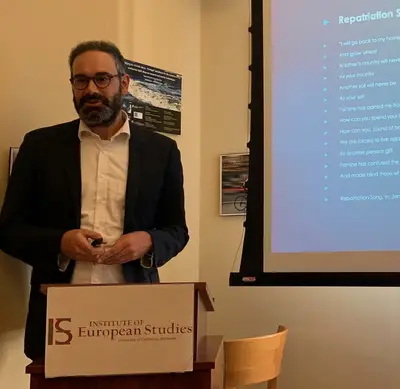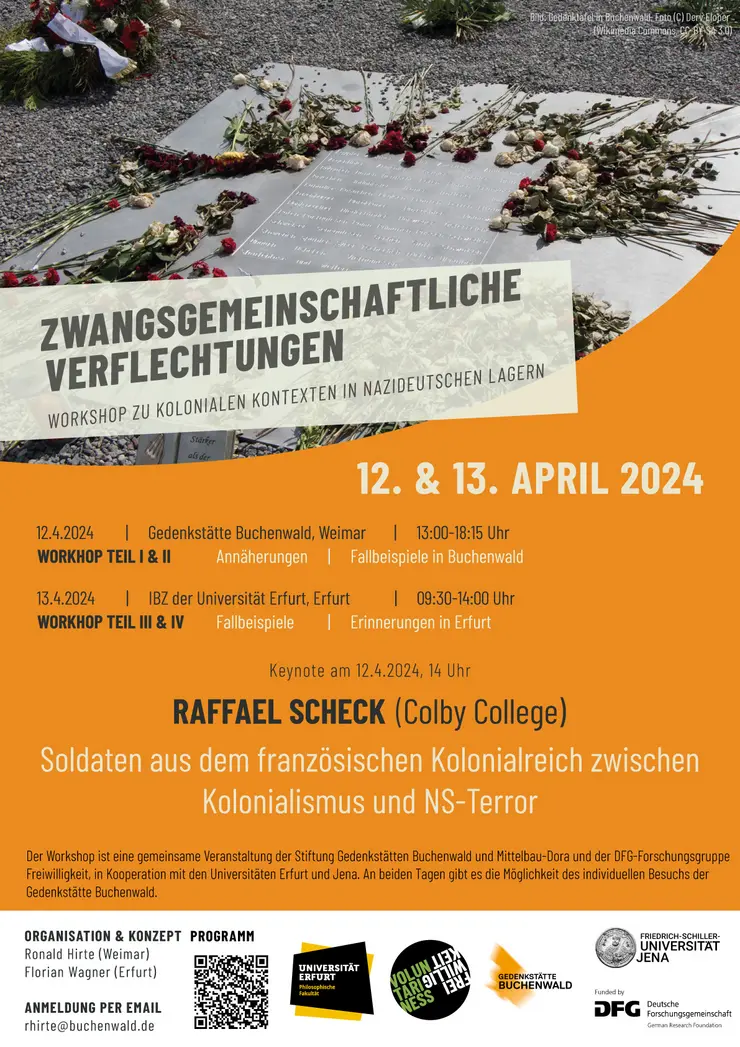Akademischer Rat für Europäische Geschichte in Globaler Perspektive /Assistant Professor for Contemporary European History in Global Perspective
Dr. Florian Wagner
florian.wagner@uni-erfurt.deAkademischer Rat für Europäische Geschichte in Globaler Perspektive (Historisches Seminar)
Sprechzeiten
Bis auf Weiteres finden Sprechstunden nur noch Online oder per Telefon statt, bitte melden Sie sich per Email an!
Besucheranschrift
Campus
Nordhäuser Str. 63
99089 Erfurt
Postanschrift
Universität Erfurt
Historisches Seminar
Neuere und Zeitgeschichte und Geschichtsdidaktik
Postfach 90 02 21
99105 Erfurt

Workshop zu Menschen aus kolonialen Kontexten mit der Gedenkstätte Buchenwald
Auch in den nationalsozialistischen Terrorstätten befanden sich Menschen aus den damaligen europäischen Kolonien. Mindestens 1.000 Menschen mit kolonialen Erfahrungen gerieten zum Beispiel in das System des Konzentrationslagers Buchenwald. Ihre Geschichte wurde bislang nicht erzählt. Diese deutsch-französische Tagung widmet sich ihrer Unterwerfung unter den Lagerterror und versucht einzelne Lebensgeschichten hinsichtlich der Frage von Freiwilligkeit und Zwang in autoritären Systemen zu rekonstruieren.
About me/Zur Person
CV and full List of Publications/Lebenslauf und Publikationsliste
My broad interests are in colonial history, history of migration, and environmental history, all linking the history of Europe, Asia, and Africa. My book on Colonial Internationalism and the Governmentality of Empire, 1893-1982 (Cambridge University Press 2022) shows how self-styled colonial experts established the International Colonial Institute in 1893 to reshape the world's colonial policies. By way of transimperial cooperation they redefined fields as different as colonial law and labor recruitment, the training of colonial administrators, tropical agriculture and medicine, indigenous representation in local councils and international organizations, as well as sustained development based on mutual aid and micro credits. The book is based on a dissertation defended at the European University Institute in Florence entitled "Colonial Internationalism: How Cooperation Among Experts Reshaped Colonialism 1830-1950."
My new book project is on the history of repatriations in a global perspective and examines the various attempts of European governments, NGOs, and international organizations to make migration undone. I use a critical approach to the concept of repatriation by situating it in a historical context that extends roughly from the 1960s to the 1990s. A fellowship granted by the German Historical Institue at UC Berkeley gave me the opportunity to explore various processes of repatriation that allows a comparative view on remigrations in the world.
My most recent publications explore African perspectives on the First World War and the Weimar Republic. I also wrote on the interconnections between different empires and imperial lobby groups, and examined key concepts such as the "West" in colonial discourse
Forschungsschwerpunkte
- Migrationsgeschichte/History of Migration
- Kolonialgeschichte/Colonial History
- Transnationale und Transimperiale Geschichte/Transnational and Transimperial History
- Europäische Geschichte/History of Modern Europe (Nineteenth and Twentieth Century)
- Afrikanische Geschichte/African History
- Globalgeschichte/ Global History
Neueste Publikationen/Most Recent Publications
- Florian Wagner: Von der Apartheid zum Ethnopluralismus. Über die kolonialen Wurzeln rassistischer „Remigrations“-Fantasien, in Geschichte der Gegenwart, 10.4.2024
- Florian Wagner/Jannis Panagiotidis (Hg.): Ausweisen-Rückführen-Abschieben, Themenheft der Zeithistorischen Forschungen/Studies in Contemporary History 20,1 (2023): zeithistorische-forschungen.de/1-2023
- Florian Wagner: "Ausweisungsgrund: Außereuropäisch". People of Color und die Entstehung des bundesdeutschen Abschieberegimes, in: Zeithistorische Forschungen/Studies in Contemporary History 20,1 (2023), S. 51-84: zeithistorische-forschungen.de/1-2023/6103
- Florian Wagner: Colonial Internationalism and the Governmentality of Empire 1893-1982 (Cambridge 2022)
- Florian Wagner: Ermächtigungsfrieden oder Ernüchterungserlebnis? 1919 aus afrikanischer und panafrikanistischer Sicht, in: Jörn Leonhard (Hg.), Große Erwartungen – 1919 und die Neuordnung der Welt, Berlin 2023, S. 169-204: doi.org/10.1515/9783110653359
- Florian Wagner: "Der Hamburger Hafen. Ort des kolonialistischen Kosmopolitismus und Mythos des Liberalismus (18.-20. Jahrhundert)," in: Jürgend Zimmerer und Kim Todzi, Hamburg: Tor zur kolonialen Welt (Göttingen 2021), 49-66
- Florian Wagner and Cornel Zwierlein: Special Issue: "Close Distance. Social Segregation in Trading Empires and Colonies, " Journal of Modern European History 18,2 (2020) https://journals.sagepub.com/toc/meha/18/2
- Florian Wagner and Cornel Zwierlein, "Close Distance: Social Segregation in Trading Empires and Colonies—An Introduction" Journal of Modern European History 18,2 (2020), 140-155 https://doi.org/10.1177%2F1611894420910688
- Florian Wagner, "Inventing Colonial Agronomy: Buitenzorg and the Transition from the Western to the Eastern Model of Colonial Agriculture, 1880s–1930s," in: Ulrike Kirchberger and Brett Bennett, Environments of Empire: Networks and Agents of Ecological Change (Chapel Hill: University of North Carolina Press), 103-128: https://flexpub.com/preview/environments-of-empire
- Florian Wagner, "Naturism, the Permanent Mandates Commission and the Denial of the Violent Nature of Colonialism", in: Haakon A. Ikonomou and Karen Gram-Skjoldager (ed.), The League of Nations. Perspectives from the Present (Aarhus: Aarhus University Press, 2019), 78-89. https://unipress.dk/media/16340/the-league-of-nations.pdf
- Florian Wagner, " Non-European Perspectives on the Weimar Republic and the German Dream of Empire (1919–1930s)", in Comparativ 26, 6 (2016), 56-72, Special Issue Citizenship in European Empires after the First World War, ed. by Sara Lorenzini. https://www.comparativ.net/v2/article/view/518/440
News
Interview mit Florian Wagner zum Begriff der "Remigration", geführt von Dr. Annegret Schüle (Erinnerungsort Topf&Söhne)
Workshop 12-13 April: Zwangsgemeinschaftliche Verflechtungen, zusammen mit der Gedenkstätte Buchenwald
Netzwerk und Blog transimperialhistory.com
Sammelezension zur International Organization for Migration erschienen
Florian Wagner ist Mitinitiator von HiWelt: Historiker*innen für ein Weltoffenes Thüringen
Florian Wagner im Arbeitsbericht des GHI-PRO/UC Berkeley


